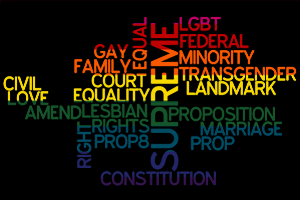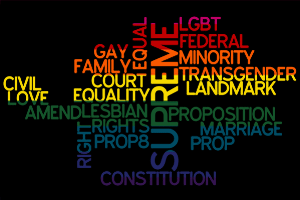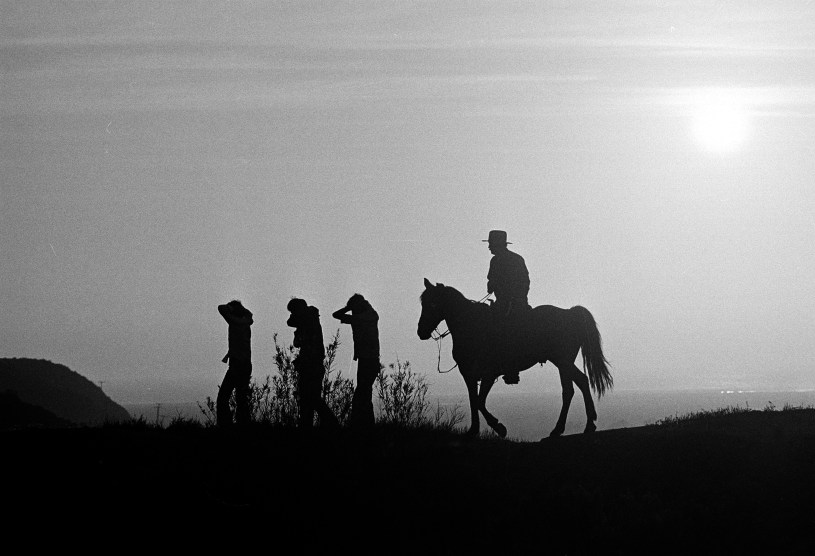
Image: <a href="/authors/celine-nadeau">Celine Nadeau</a>
READ ALSO: MoJo reporter Josh Harkinson on the jubilation in San Francisco and Road Trip blogger Tim Murphy on the reaction in Louisiana. Plus: Does Judge Walker’s personal life matter?
Judge Vaughn Walker in San Francisco has overturned Prop. 8, California’s same-sex marriage ban. His ruling reads: “Proposition 8 fails to advance any rational basis in singling out gay men and lesbians for denial of a marriage license. Indeed the evidence shows Proposition 8 does nothing more than enshrine in the California constitution the notion that opposite sex couples are superior to same sex couples.”
As the daughter of a lesbian couple that’s been together for 30 years, my reaction is kind of lukewarm. Don’t get me wrong: I think this is a significant milestone and a huge step forward. But this fight is far from over. Walker’s ruling will be challenged all the way up to the US Supreme Court, and with that court’s rightward shift, there’s no guarantee it will rule the way it should. I’m not too worried though, because Walker and the opponents of Prop. 8 are on the right side of history. I’ve had that sense of moral certainty for as long as I can remember. And when I look back at how far the movement has come in 20 short years, today’s decision is just another reminder that we’re on the right track.
Consider this: It was 1989 when an American court for the first time ever granted same-sex families—and by extension my own family—some semblance of legitimacy in the eyes of the law. The case started in 1986 in New York City. Leslie Blanchard and Miguel Braschi were two men who’d been in a committed relationship for more than 10 years when Blanchard died of AIDS. Their rent-controlled apartment was leased in Blanchard’s name, so the landlord saw the death as his chance to force Braschi out and jack up the rent. (Because Braschi was not related to Blanchard by birth or marriage, he didn’t qualify as family in order to meet the rent-control requirements.) Braschi took the case to court, arguing that the meaning of family should not be limited to blood, marriage, or adoption but instead should be determined by the extent to which its members are emotionally and financially interdependent. New York’s Court of Appeals agreed, ruling that rent-control protections “should not rest on ficticious legal distinctions or genetic history, but instead should find its foundation in the reality of family life.”
It’s ironic that today’s focus is on marriage—one of those “fictious legal distinctions.” But for better or worse, it’s that legal distinction that will bring public acknowledgement and equal treatment to gay couples. And it’s also that legal distinction that would have brought me—who once upon a time was embarrassed to talk about my moms—a whole lot of security and comfort growing up.
I was eight when Braschi’s case was decided. Like any normal eight-year-old, I certainly wasn’t up on LGBT caselaw, and I definitely didn’t know how precarious my family’s legal situation was. But although I didn’t understand it intellectually, I could feel it in my gut. I knew that my family was different, and that most Americans didn’t approve of it. No matter how loving a family is—and let me tell you, mine epitomizes the four-letter verb—that’s a whole lot of shame for a third-grader to internalize. And that shame is probably part of the reason why, in October 2008, I was a sobbing mess as I spoke at my moms’ wedding. (They’d scheduled the wedding before the November elections, knowing that Prop. 8 would likely pass, making their nuptials no longer legally viable.) As I stood before 150 of our closest friends and family with one mom on either side of me, so many things raced through my mind, like all the times I heard the word “faggot” casually thrown around at recess, and how Ellen DeGeneres stunned the nation when she came out on TV only a decade earlier. But most of all, the thing making me bawl like a baby was knowing that I hadn’t talked to my best friend about my moms being gay until after we’d graduated from high school in 1999. And that, right there, is why marriage is so important. It’s a public seal of approval. It’s our society saying that one’s sexual orientation, or the sexual orientation of one’s parents, doesn’t bestow second-class citizenship. And that it’s never something to be ashamed of.
It didn’t take Judge Walker’s ruling today for me to know that my moms deserve the rights of marriage. But after all this time, it sure is good to hear a judge say it.










